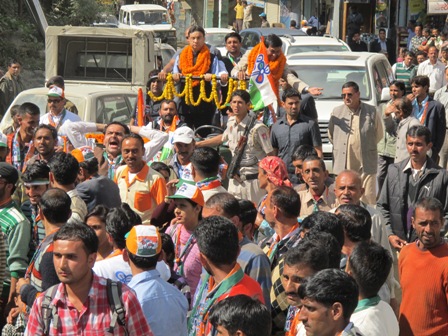New Delhi, June 19 (IANS) Submerged roads, crippled traffic, people wading in knee-deep water mixed with sewage — these are common scenes in the national capital every year, as civic authorities consistently fail the monsoon test.
The intermittent-to-heavy monsoon rains Saturday and Sunday exposed the shoddiness of de-silting work undertaken by the Public Works Department (PWD) and the three municipal corporations — North, East and South — of Delhi.
Facing flak for flooding at the Indira Gandhi International (IGI) airport, the PWD said the monsoon this year arrived in the city ahead of schedule, before de-silting work could be completed.
“Monsoon reached Delhi in mid-June this year. Our deadline for the work was August 15. So the problem of flooding occurred at IGI airport. We are cleaning the drain being constructed parallel to National Highway 8, which drains water from the airport,” S.D. Sankhyan, assistant director (works) PWD told IANS.
“The cleaning of drains and roads will be completed by June 30,” he said.
PWD handles 90 percent of the de-silting of storm water drains in the capital.
Apart from PWD, the three municipal corporations registered 147 cases of clogging after rain swamped the national capital Sunday.
“The north corporation is fully prepared with pump sets and workforce to address the woes of the monsoon. Workers were not prepared for an early monsoon, though,” P.K. Gupta, north Delhi municipal commissioner, told IANS.
The South corporation has 1,464 storm water drains, while North and East corporations have yet to undertake cleaning work in 1,179 and over 1,000 such drains, respectively.
“We have deputed the necessary workforce, and even have portable pump sets to look after flooding and drain clogging,” Yogendra Mann Singh, spokesperson of the east Delhi corporation told IANS.
South Delhi Municipal Commissioner Manish Gupta, however, explained that the city’s water-logging concerns would never be completely resolved by taking up only desilting: “The process of desilting has been completed by June 15… it is important to see that desilting cannot clear the capacity of the channel. The process of water logging can never be wiped out from the city, as the water percolation level is very low in Delhi,” he said.
That is an explanation many Delhi residents are unwilling to buy.
Many residents’ welfare associations contend that de-silting may be just one measure to ease the problem of water-logging, but even that measure is not being satisfactorily performed.
“De-silting is not complete. Rain of just half an hour can cause flooding of large areas. Corporation workers leave the muck they clear from the drain right at the edge of the drain, and with the slightest rain, it goes right back in. So what use is that kind of de-silting,” asks Anil Bajpai, president of the east Delhi RWA.
Pankaj Agarwal, of the south Delhi RWA Joint Front, said: “The areas around Green Park, Safdarjung Enclave and Arjun Nagar in South Delhi are the worst affected. The problem is that smaller drains are not connected to the bigger ones; the smaller ones overflow, and the water enters homes.”
B.S. Vohra, another representative of a residents’ welfare organisation, said: “The corporations alone cannot do much. Other government agencies like Delhi Jal Board are also responsible for the cleaning of drains and clearing of sewage.”
“The DJB charges 60 percent from the bill paid by the citizens as sewage tax, so they ought to clear the sewage,” Vohra said.
The officials of the three corporations blamed government agencies like PWD and DJB too.
“Instead of blaming the corporation alone, if there is a water-logging or a road caves in, government agencies should swing into action without arguing about the agency under whose jurisdiction the matter falls. Once work is complete, they could then pass a letter or impose a fine on whoever was responsible for the lapse,” Manish Gupta said.
Traffic policemen pointed out that the snarls witnessed because of water-logging were caused by poor maintenance of drains.
“The main problem is flooding of roads. We notify the civic agencies, and it is up to them to look after that problem,” Taj Hasan, special commissioner of police (Traffic), Delhi, said.
The opinions, beliefs and viewpoints expressed by authors, news service providers on this page do not necessarily reflect the opinions, beliefs and viewpoints of Hill Post. Any views or opinions are not intended to malign any religion, ethnic group, club, organization, company, or individual.
Hill Post makes no representations as to the accuracy or completeness of any information on this site page.


